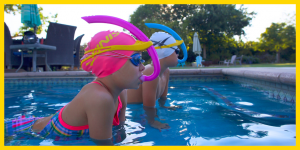Elizabeth Wickham, SwimSwam
September 5, 2019
Has your child ever ignored or withdrawn when you talked to them after a race? We think our kids understand that our advice comes from a good place. In reality, they may be interpreting our words and body language entirely differently than how we intended.
In a webinar by David Benzel called “5 Powerful Strategies for Sports Parents Success,” he describes five traps we fall into, their consequences and then gives a prescription for better results. Benzel founded “Growing Champions for Life” and offers monthly webinars and works with organizations like USA Swimming to help parents and athletes.
I fell into some of the traps Benzel mentioned — like focusing on performance and riding the emotional rollercoaster at meets. I wish I had recognized these pitfalls earlier in my swim mom career.
Here are five traps Benzel described along with consequences and what we can do to turn the situation around:
ONE
Trap: Making our children’s sport the center of our universe.
Consequence: Pressure to win replaces the joy of the journey.
Rx: Focus on family core values and the large character issues that lead to a life well lived. Core values may include integrity, honesty, hard work, etc.
TWO
Trap: Strong urge to “tell” rather than “ask.”
Consequence: Children clam up, shut down and stop sharing information.
Rx: Be curious, listen first and wait to be invited into the conversation. Be ready to say, “Tell me more.”
THREE
Trap: Trying to light a fire under your child.
Consequence: Child fails to take responsibility for finding their own motivation.
Rx: Demonstrate an inspiring example with your own life and create an inspiring environment that rewards effort at home.
FOUR
Trap: Over analyzing technique and critiquing performance outcomes.
Consequence: Resentment and defensiveness as your child fears disappointing you.
Rx: Allow performance to belong to your child. Provide unconditional love regardless of performance levels.
FIVE
Trap: Showing disappointment with your body language during competitions.
Consequence: Interpretation by children is “I’m not good enough” and reduced confidence.
Rx: Restrain our emotional responses from being too high or too low. In other words, try to get off the emotional roller coaster.
Which of these traps have you fallen into as a swim parent? What strategies have you used when you realize the conversation isn’t going well with your child?
Read the original article here
Recent Articles
Dylan Carter
Chelsea Hodges
Lorenzo Zazzeri

Introducing the Stability Snorkel Jr
Share on Social Media


